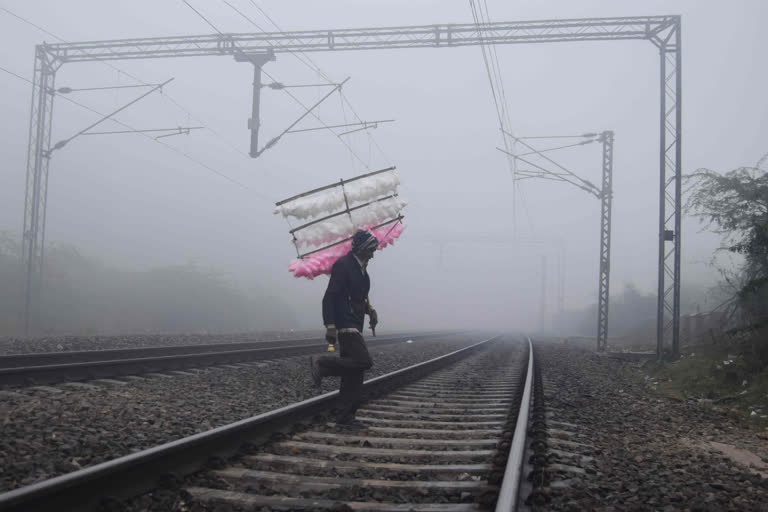New Delhi/Hyderabad: The India Meteorological Department (IMD) has issued an "orange" alert for certain parts of north India, including Delhi, for Monday, warning that dense fog, cold day and cold wave conditions would persist. It was the fourth day on the trot that the national capital's minimum temperature was lower than most of the hill stations.
According to the data released by the IMD, visibility recorded at 5:30 am today in Bhatinda-0 metres, Amritsar-25 and Ambala-25 metres each, Hissar-50 metres, Delhi (Safdarjung)-25 metres, Delhi (Palam)-50 metres; Uttar Pradesh: Agra-0 metre, Lucknow (Amausi)-0 metres, Varanasi (Babatpur)-25 metres, and Bareilly-50 metres.
As per Satellite imagery and available visibility data from the IMD, the fog layer extended from Punjab and adjoining northwest Rajasthan to Bihar across Haryana, Chandigarh and Delhi and Uttar Pradesh. The dense fog that engulfed the national capital caused delays in flight operations at the Indira Gandhi International Airport (IGIA).
The IGIA in a statement said: "Low visibility procedures are in progress at Delhi airport....Passengers are requested to contact the airline concerned for updated flight reactions". As many as 29 trains were running late in the Northern Railway region alone on Monday, due to fog, including the Rajdhani Express trains. Delayed due to fog and cold, passengers were seen facing a lot of problems.
Mercury plummets
Delhi' primary weather station the Safdarjung observatory logged 1.9 degrees Celsius, the lowest in January in two years. The Safdarjung observatory had logged a minimum temperature of 2.2 degrees on Saturday, 4 degrees on Friday, 3 degrees on Thursday and 4.4 degrees on Wednesday.
Meanwhile, the minimum temperature recorded in the hill stations of Himachal Pradesh and Uttarakhand were as follows: including Chamba (8.2 degrees), Dalhousie (8.2 degrees), Dharamshala (6.2 degrees), Shimla (9.5 degrees), Hamirpur (3.9 degrees), Manali (4.4 degrees), Kangra (7.1 degrees), Solan (3.6 degrees), Dehradun (6 degrees), Mussoorie (9.6 degrees), Nainital (6.2 degrees), Mukteshwar (6.5 degrees) and Tehri (7.6 degrees).
With frosty winds from the snow-clad mountains pounding north India, the mercury dropped in Haryana's Hisar (1.4 degrees), Punjab's Adampur (2.8 degrees), Rajasthan's Churu(minus 0.5 degree), and Pilani(1.5 degrees); Uttar Pradesh's Prayagraj(3.2 degrees) and Varanasi(3.8 degrees); Bihar's Gaya(2.9 degrees); Madhya Pradesh's Nowgong(minus 1 degree) and Umaria(1.5 degrees).
Winter vacation extended in Delhi
While the cold snap, which is straining power grids and posing challenges to the homeless and animals, prompted the Delhi government to extend winter vacation in schools till January 15, the dense layer of fog which persisted over north, east and northeast India affected the road, rail and air traffic movement.
"Around 335 trains have been delayed, 88 cancelled, 31 diverted and 33 short terminated due to foggy weather," a railway official said. Around 25 flights were delayed and two diverted Sunday morning, officials at the Indira Gandhi International Airport said.
When will the cold wave conditions abate?
According to a senior IMD meteorologist, a short-term relief is likely on the cards in the next few days under the influence of back-to-back western disturbances. When a Western disturbance -- a weather system characterised by warm moist winds from the Middle East -- approaches a region, the wind direction changes. Hence, the chilly northwesterly winds from the mountains will stop blowing for a few days leading to an increase in temperatures, the scientist was quoted as saying by PTI.
"Cold wave and cold day conditions over northwest India (are) likely to abate after 48 hours. Dense to very dense fog conditions over many parts of Punjab, Haryana, Delhi, Uttar Pradesh and Bihar (are likely) during the next 48 hours and decrease in intensity and distribution thereafter," the IMD said in a statement.
Precautions suggested
The IMD warned of an impact on agriculture, livestock, water supply, transport and the power sector at some places. The weather office also said frostbite can occur due to a prolonged exposure to cold and that one should not ignore shivering -- the first sign that the body is losing heat -- and should stay indoors.
"Eat vitamin C-rich fruits and vegetables and drink sufficient warm fluids to maintain adequate immunity. Avoid or limit outdoor activities," the weather bureau said in an advisory.



